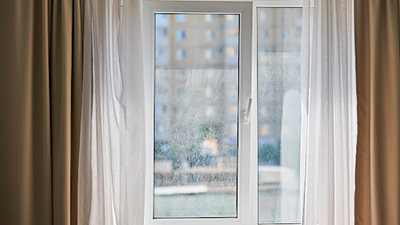
Cincinnati may be slogging through winter, but spring will be here soon! Spring officially arrives on March 20 and as it blooms, so do the allergens that can make us a sniffling, sneezing, mess. Like many parts of the country, Cincinnati allergy sufferers slide into spring amid a haze of pollen and histamines.
Did you know that dirty house windows can aggravate your allergies? It’s true, but there are ways to minimize some of those issues.
Spring Allergies and Symptoms
In the Cincinnati region, ragweed and mold are the two top allergens, according to TriHealth. Ragweed is not a spring allergen as it peaks from August through October. Mold is a year-round issue. However, one of the most problematic allergens in spring is tree pollen.
Tree pollen season typically runs from February through May, but season length can vary each year. The fine, powdery tree pollen spreads with the wind, depositing on everything from cars to patio furniture and windows. Pollen and other allergens can cause a variety of symptoms including:
- Sneezing
- Watery, itchy, red eyes
- Coughing
- Scratchy, sore throat
- Sinus pressure and headaches
- Skin irritations
- Wheezing and shortness of breath
40 to 50 million people in the United States suffer from allergic rhinitis. Allergies shouldn’t be ignored as they can trigger asthma and other breathing issues. You can track local allergen levels at sites like AcuWeather (Cincinnati) and Pollen.com (Cincinnati). Pollen.com not only provides a five-day outlook but gives the top daily allergens for the area.
While seasonal allergies may be difficult to avoid, you can take steps to reduce exposure to the allergens that cause the symptoms that make you feel awful.
Ways to Keep the Allergens Out of the Home
If you can keep allergens out of your living space, you can help reduce allergy symptoms and get back to enjoying the spring season. Top ways to keep allergens out of your home include:
- Replace/repair the caulk around the windows
- Replace/repair the caulk/seals around doors
- Weekly wash down patio furniture/cushions
- Keep exterior and interior windows clean
- Daily mop entrance areas
- Remove shoes when entering the home
After spending an extended time outdoors, change clothes and shower/bathe before sitting on furniture or climbing into bed.
Indoor Air: Keeping it Clean
For people with severe allergies or other chronic breathing conditions, it can be helpful to use an air purifier to improve indoor air quality. Keep windows closed during the times with the highest allergen counts and run the air purifier. Typically, pollen counts are highest in the early morning and early evening.
Clean Windows and Window Treatments
Pollen that collects on the exterior window glass can find its way indoors and trigger allergies. It’s critical to have windows cleaned in spring. It not only removes the grime from the winter that can damage glass over time, but it helps remove the pollen and other allergens that collect.
Inside, don’t forget to clean all window treatments, from curtains to shades and mini-blinds. Keep everything dust-free to reduce allergy triggers.
Wash the interior windows and windowsills as well. This will also reduce the presence of mold, dust mites, and other insect intruders.
Dirty windows can house allergens, but your windows don’t have to be dirty. Contact United Window Cleaning today to schedule an appointment. We can clean your windows professionally and help reduce those allergens that can make spring the sneeziest of seasons.


